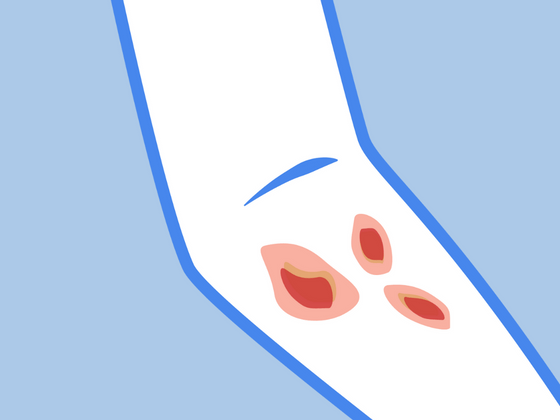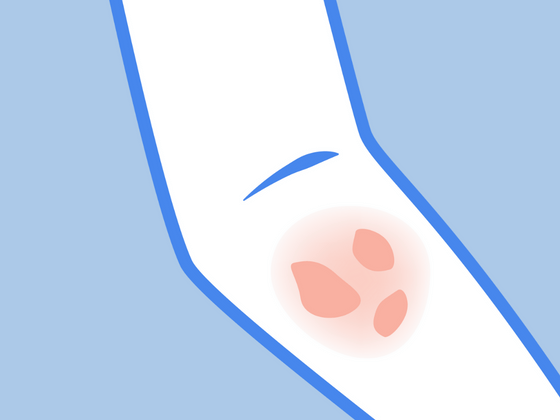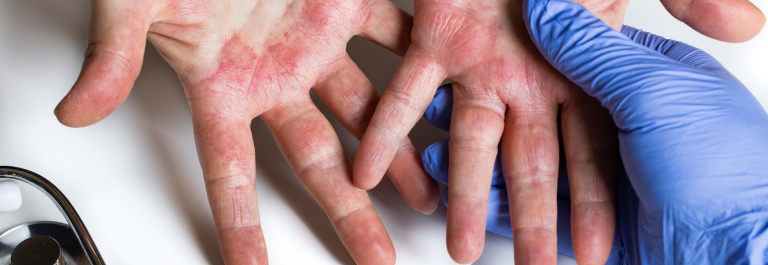Although prevalent among individuals with anxiety disorders and other mental health conditions, the development of skin-picking behaviors can also occur due to dementia. Dementia-related skin picking refers to the compulsive behavior of repetitively touching, scratching, or picking at the skin, commonly seen in individuals experiencing progressive dementia. It can result in skin damage, as well as a heightened risk of infections.
We understand it can be difficult to see your loved one with dementia picking at skin. In this blog, we're going to cover everything you need to know about dementia skin-picking disorder, including:
-
Potential causes and triggers
-
The symptoms of skin picking in dementia patients
-
Treatment methods and preventative measures
Continue reading to learn more about dementia skin picking and how you can address this challenging aspect of dementia care to ensure the well-being and skin health of individuals coping with cognitive decline.
Understanding and Causes and Triggers
Dementia, a progressive cognitive decline, often intertwines with various behaviors, including skin picking. This behavior can arise due to multiple factors prevalent in dementia patients. One significant trigger is the sensation of itchiness, a common symptom among older adults, which prompts individuals to seek relief through skin picking.
Additionally, tactile hallucinations or delusional thought patterns play a role in skin picking. For example, dementia patients might experience sensations on their skin that aren't actually present, leading them to compulsively pick at their skin in response to these perceived stimuli. Moreover, psychological factors, prevalent in many dementia cases, contribute to skin-picking tendencies. The confusion, agitation, or anxiety experienced by individuals with dementia can manifest in the form of repetitive behaviors, including compulsive skin picking.
Finally, Alzheimer's disease, a prevalent form of dementia, notably influences skin-picking behaviors. The progressive nature of Alzheimer's alters cognitive functions, impacting a patient's ability to control impulses and engage in coherent reasoning. This cognitive decline can exacerbate skin-picking tendencies, making it challenging for patients to resist the urge to pick at their skin.
Symptoms of Dementia Skin Picking
Skin picking in dementia patients presents various symptoms, ranging from visible skin damage to open wounds. The compulsive nature of this behavior can also result in skin irritation, redness, and sometimes bleeding. These symptoms affect the skin's health and increase the risk of infections, posing a significant concern for caregivers and medical professionals.
What's the Impact of Compulsive Skin Picking?
Managing skin-picking behaviors can significantly impact the patient's comfort and overall quality of life. However, the impact of skin picking extends beyond physical symptoms, influencing a patient's social life and overall well-being. Patients may experience discomfort, pain, or embarrassment due to skin damage, affecting their confidence and social interactions. Additionally, managing this behavior presents a considerable challenge for family members and caregivers. It demands continuous monitoring, intervention, and specialized care to prevent skin damage and infections, adding to the complexities of caregiving for individuals with dementia.
Risk Factors and Associated Conditions
Compulsive skin picking poses a heightened risk of skin damage and infections in dementia patients, leading to potential complications. This repetitive behavior increases vulnerability to skin injuries, including open wounds, making them more susceptible to infections.
Moreover, it's essential to consider related disorders like excoriation disorder and mental health conditions like obsessive-compulsive disorder (OCD) in individuals with dementia. These conditions often overlap with skin-picking behaviors, exacerbating the challenges of managing these compulsive tendencies and demanding comprehensive approaches tailored to address both cognitive decline and associated behavioral disorders.
Preventive Measures for Managing Skin Picking
To prevent itching or minimize the urge for dementia patients to pick at their own skin, here are some suggestions:
Keeping the Skin Moisturized
Keep the skin hydrated to reduce dryness and itchy skin. This Grass Fed Tallow Balm is one of the world's earliest and purest forms of skincare, making it a natural and nourishing treatment for itchy, dry skin. Sourced from grass-fed and finished cows, it's an excellent choice for allergy-prone skin and skin diseases like eczema and psoriasis. It's the perfect addition to your loved one's paleo skincare routine.
Avoiding Irritants
Many soaps, body washes, and detergents contain harsh chemicals or irritants that can further aggravate the skin and subsequently encourage skin picking. We recommend using gentle soaps like this Soap for Eczema with Chinese Herbs. Made with rich and moisturizing Chinese herbs, it cleanses the skin without stripping it of its natural, protective oils.
Maintaining Good Skin Hygiene
Maintaining a good skin hygiene routine is a great way to discourage skin picking. This can look like encouraging regular showers or baths and keeping the nails trimmed short. When bathing, be sure to use lukewarm water instead of hot as hot water can exacerbate dry skin and feelings of itchiness.
Distraction Techniques
Engage in activities that divert attention from the urge to pick. For example, family members and caregivers can assist by providing fidget toys or redirecting attention during an episode.
Wearing Protective Clothing
If your loved one is constantly picking at their skin, encouraging them to wear gloves can help minimize the potential for open wounds and infections. These Remedywear™ (TENCEL + Zinc) Gloves for ADULTS can help reduce the harmful impacts of skin picking. You can also encourage them to wear clothing that limits access to targeted areas. These Remedywear™ (TENCEL + Zinc) Sleeves/Bandages for Babies to Adults (One Pair) are great for targeting areas like the bends of elbows and creases of knees.
Creating a Supportive Environment
This can look like creating a calm atmosphere, engaging in meaningful activities, providing emotional support, or encouraging your loved one to seek treatment such as behavioral therapy. Remember that consistent communication, patience, and understanding are key.
Support your Loved One with Alzheimer's Disease and Skin Picking Disorder Today
Get started with these preventative measures and protective strategies to alleviate the stress dementia skin picking causes for both dementia patients and caregivers.








